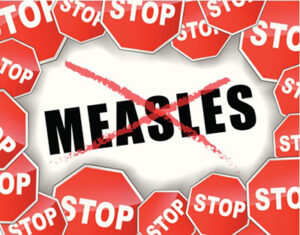(Source: BlackDoctor.org)
Measles is not new, but in 2025 it has made an unexpected resurgence. According to the Centers for Disease Control and Prevention (CDC), the number of confirmed measles cases is now up to 121 since they began tracking on January 1. The outbreak, as it’s being called, is believed to have started with a group of unvaccinated people who visited Disneyland and has since spread to 17 states. Measles is an infectious disease and knowing the facts can keep you and your loved one healthy.
Measles in 2025 Is a Little Different
What is it?
Measles (Rubeola) is a highly contagious respiratory disease caused by a virus, according to the CDC.
How do you get it?
It spreads through the air through coughing and sneezing. Every infected person can potentially spread it to an average of 18 people. The CDC also states the virus can survive on surfaces for up to two hours.
What are the symptoms?
Early symptoms
- Cold-like symptoms such as a cough, runny nose, sneezing, and aches and pains
- Sore, red eyes that may be sensitive to light
- Fever of 38°C or higher
- Small white or red spots inside the mouth called Koplik’s spots
- Loss of appetite
- Tiredness, irritability, and a general lack of energy
Rash
- Flat, discolored areas (macules) and solid, red, raised areas (papules) that later join together
- Itchy rash that usually starts on the face and spreads to the neck, trunk, arms, legs, and feet
Other symptoms
- Hoarseness
- Enlarged lymph nodes
- Gastrointestinal symptoms, including diarrhea, vomiting, and abdominal pain
- Complications Blindness
- Encephalitis (an infection causing brain swelling and potentially brain damage)
- Severe diarrhea and related dehydration
- Ear infections
- Severe breathing problems, including pneumonia.
About three out of 10 people who get measles will develop one or more complications including pneumonia, ear infections, or diarrhea, says the CDC.
Vaccinations
The CDC states the best way to protect against measles is to get the measles-mumps-rubella shot (called the MMR shot). The vaccine is 95 percent effective and measles is considered a vaccine-preventable disease.
Doctors recommend that all children get the MMR shot. A measles shot is often required for school enrollment, but many parents choose not to vaccinate.
The MMR shot:
- Protects your child from measles, a potentially serious disease (and also protects against mumps and rubella)
- Prevents your child from getting an uncomfortable rash and high fever from measles
- Keeps your child from missing school or childcare (and keeps you from missing work to care for your sick child)
Doctors recommend that children get 2 doses of the MMR shot for best protection. Your child will need one dose at each of the following ages:
- 12 through 15 months
- 4 through 6 years
Infants 6 months to 11 months old should have 1 dose of MMR shot before traveling abroad.
Is measles only a concern for children?
No! Vaccination is also recommended for adults. Complications from measles are more common in adults (and young children). About one or two in every 1,000 people who get it will die, according to the CDC.
Death from Measles This Year (And its Spreading)
An unvaccinated school-aged child in Texas has died of measles, the first death associated with an outbreak in the western part of the state that has infected more than 100 people.
Lubbock city spokesperson Lauren Adams confirmed the death to ABC News on Wednesday.
In a press release, the Texas Department of State Health Services (DSHS) said the child was hospitalized in the northwestern city of Lubbock last week and tested positive for measles.
MORE: Measles cases are rising in US as Texas outbreak grows. Should we be concerned?
As of Wednesday, 124 cases of measles have been confirmed associated with the outbreak, according to data from DSHS.
Almost all of the cases are in unvaccinated individuals or individuals whose vaccination status is unknown, and 18 people have been hospitalized so far, DSHS said.
“This death underscores the real danger of measles — it’s a severe disease that can take lives despite being preventable with vaccination,” said Dr. John Brownstein, an epidemiologist and ABC News contributor. “Every new case is a reminder of why vaccination is critical. Tragically, with an outbreak of this scale, a fatal case was not unexpected, especially among those unvaccinated. Given how contagious measles is, we anticipate more cases in the coming weeks.”
Just this week, health officials with the Kentucky Department for Public Health (KDPH) and Franklin County Health Department announced a confirmed case of measles in a Kentucky resident. They said the person had traveled internationally to an area with an ongoing measles transmission.
Kentucky health officials are working to identify and contact those who may have been exposed to the virus. The person went to a Planet Fitness on Allen Way in Frankfort on Feb. 17 from 9 a.m. to 12:15 p.m. while they were infectious. Anyone who was at the gym during that time might have been exposed.
 Should You or Your Family Get Vaccinated?
Should You or Your Family Get Vaccinated?
It’s not just kids who should be vaccinated. Infectious disease experts say some adults may need to get revaccinated, too.
Measles can spread incredibly fast — it’s one of the world’s most contagious diseases, more than flu, polio, COVID, or just about any other infectious disease.
The best defense against measles is vaccination. The vast majority of people getting sick in Texas are unvaccinated. And the measles vaccine is both safe and highly effective, says Dr. William Schaffner, a professor of infectious diseases at Vanderbilt University Medical Center.
“If you have been vaccinated with two doses of vaccine as per routine, you have a 95-plus percent chance of being completely protected throughout your life,” Schaffner says.
But public health experts say there are some adults who should consider getting revaccinated. That includes older adults who were born after 1957 and were vaccinated before 1968.
That’s because early versions of the measles vaccine were made from an inactivated (killed) virus, which didn’t work particularly well, Offit says. That’s why the Centers for Disease Control and Prevention recommends that anyone vaccinated before 1968 get at least one dose of the live attenuated vaccine.

